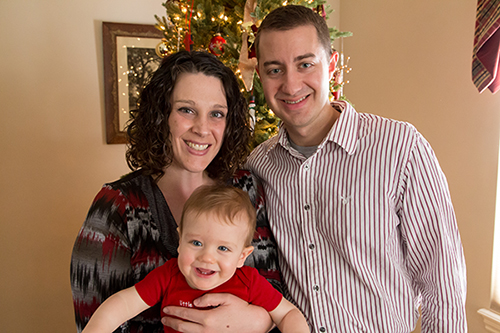
Melissa Peterson knew she wanted to teach others how to become nurses from the time she herself was in nursing school in Tulsa. The University of Arkansas master's degree program in nursing helped her make that dream come true.
The program from which Peterson graduated in December 2013 jumped 91 places in the U.S. News & World Report Best Graduate Schools rankings released March 10. It is now ranked No. 75 on the list and No. 50 among public institutions. The magazine does not rank all graduate programs every year. It most recently ranked graduate nursing programs in 2011.
"This significant improvement in the rankings reflects the excellence and commitment of our faculty to provide a high-quality graduate nursing program," said Tom Smith, dean of the College of Education and Health Professions.
The Eleanor Mann School of Nursing at the U of A first offered a face-to-face Master of Science in Nursing degree in 2005. The first concentration prepared adult clinical nurse specialists. After that first cohort graduated in 2007, the school began to deliver the degree program online through the Global Campus at the U of A. The program includes a clinical component that can be completed in the student's home area.
"I grew up in Northwest Arkansas and I always loved the Razorbacks," said Peterson, who earned her Bachelor of Science in Nursing from the University of Tulsa in 2006. "I heard about the U of A's master's program by researching local programs online. I wanted the flexibility of doing an online program because I didn't know where our jobs might take us."
Peterson is married and has a 1-year-old son.
"I knew that no matter what we would be doing job-wise, I would be able to finish my education," she said. "When I talked with faculty members before starting the program, I was concerned about going to a big school. I didn't want to be a number, not a name. The faculty immediately made it clear that would never be an issue.
"I felt like I had a lot of one-on-one guidance I would not have gotten in a big classroom," Peterson continued.
She works as a clinical adjunct professor at the University of Central Oklahoma in Edmond. She teaches the clinical components of community health nursing and leadership courses to seniors who are in their final semester before graduation.
"I grew up in a family that works in the medical profession," Peterson said. "I got a stethoscope for Christmas my senior year in high school because I knew I wanted to be a nurse. My undergraduate faculty advisers (at Tulsa) were very influential in me understanding I wanted to be a nurse educator. I saw how the experiences you have in nursing school, whether positive or negative, influence how you practice as a nurse. The more positive your experience, the more it shows in the care you give to others. I was able to see the excitement that builds from positive experiences, and I knew I wanted to be able to share that with other nurses through a nurse-educator role."
The U of A nursing school, which is part of the College of Education and Health Professions, has 21 students enrolled in the nurse educator concentration of the M.S.N. program and five students finishing the clinical nurse specialist concentration. The clinical nurse specialist concentration is now offered at the doctoral level since the nursing school began offering a Doctor of Nursing Practice degree in 2013. It is also offered online through the Global Campus and has 57 students enrolled.
Nursing faculty say that they strive to offer individualized instruction in an online environment such as Peterson described.
"The graduates of our M.S.N. program are impacting nursing care in the region," said Jan Emory, an assistant professor of nursing. "Our program fills a critical need for preparing faculty to teach, particularly in baccalaureate nursing programs."
The national Institute of Medicine has set a goal for 80 percent of the nation's nurses to hold at least a bachelor's degree by 2020. And, as bachelor's degree programs for nurses increase enrollment, the need for more nursing faculty members grows as well.
"Our graduates have gone on to secure full-time employment as nurse educators throughout the region," Emory said. "Our faculty help our master's students identify how their own practice is a foundation they can use to become curriculum leaders, to develop the knowledge and skills they need to educate other nurses. The specialty of nurse education allows our students to create learning experiences that develop nurses who are patient-centered and who deliver evidence-based care."
Kathleen Barta, graduate coordinator for the nursing school and associate professor of nursing, said the Global Campus staff provides excellent support for both the faculty and students of the master's program.
"Our online courses meet high standards of quality for online education set by Quality Matters," Barta said, referring to a program that sets national guidelines for online education. Quality Matters develops and disseminates rubrics for the effective design of online and blended courses, based on research findings on effective online learning and best practices advocated by leading distance learning organizations.
Barta and Emory also said the satisfaction that comes from working as a nurse educator is different from the satisfaction of being a nurse.
"You can take joy in seeing a student become a nurse and that your influence is spread to all of the patients those nurses will care for," Emory said. "The M.S.N. educator role prepares graduates who are excellent practitioners to share their passion for nursing with the next generation through education."
The Global Campus works with colleges and schools across the Fayetteville campus in the development and delivery of online degree programs and courses. The University of Arkansas ONLINE website offers a complete list of the university’s online educational offerings.
Contacts
Heidi Wells, director of communications
College of Education and Health Professions
(479) 575-3138,